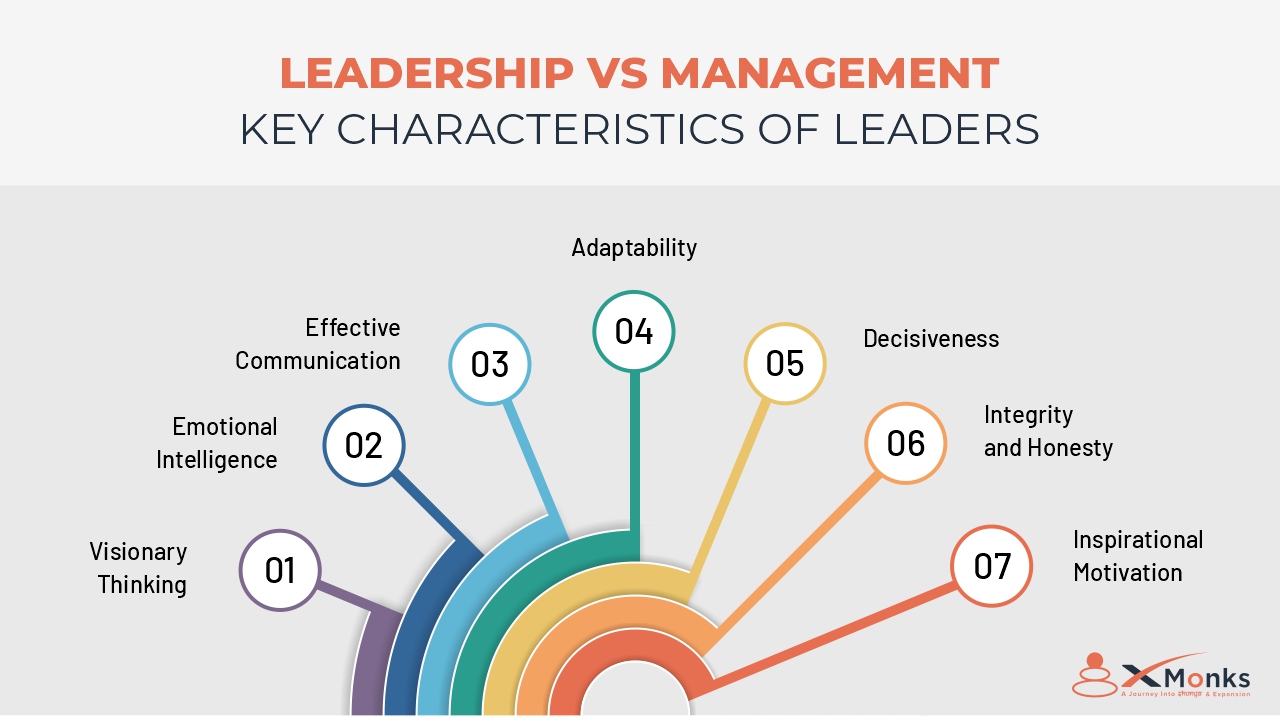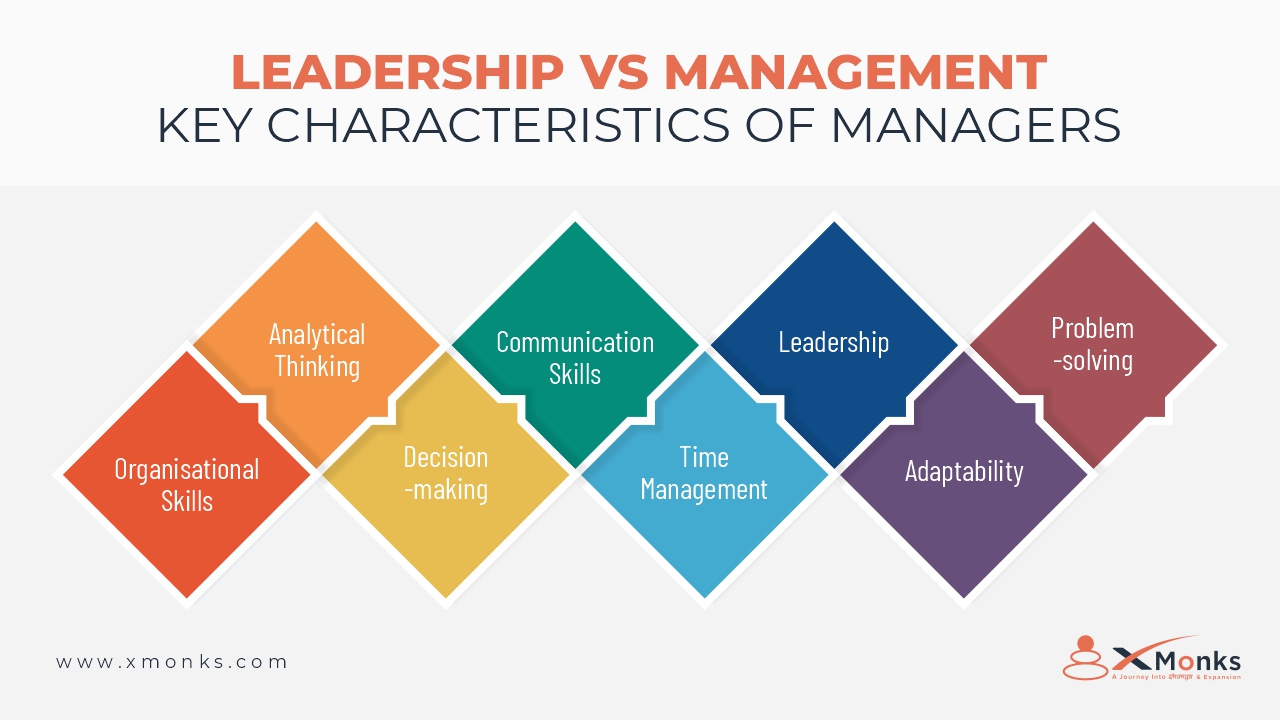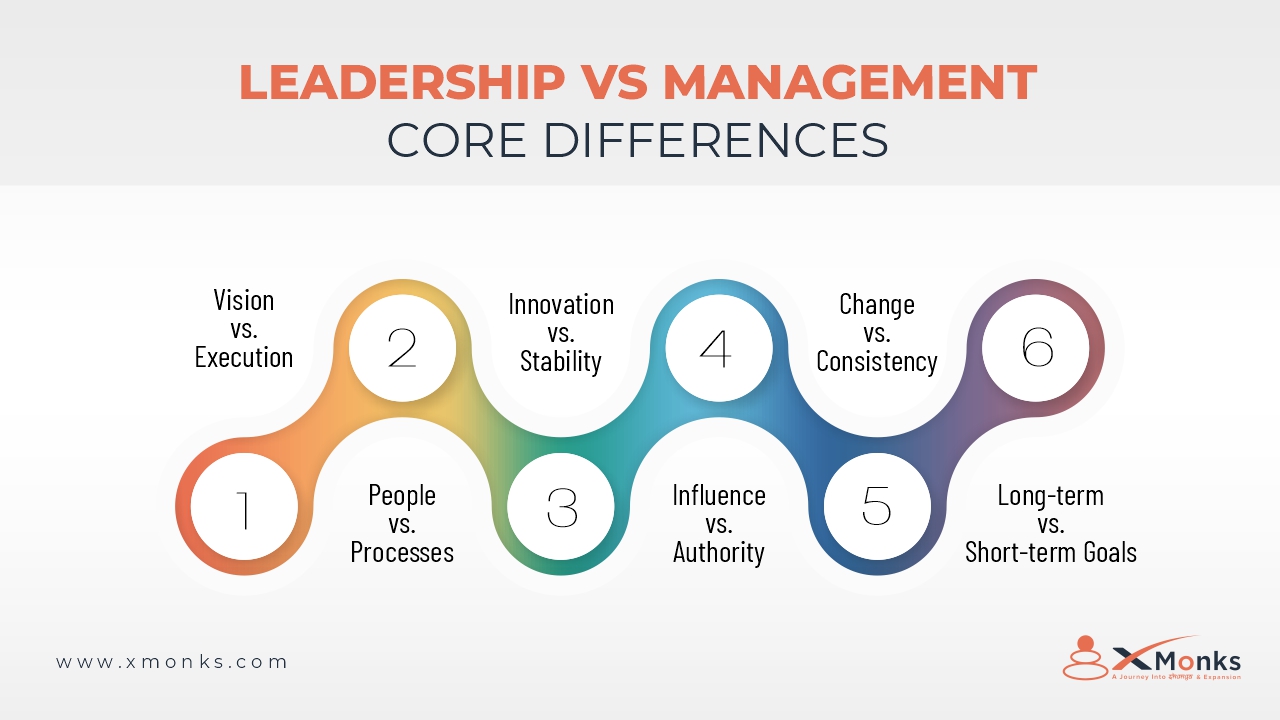Difference Between Leadership and Management: An In-depth Analysis

Introduction
In today’s dynamic business environment and corporate glasshouses, the terms “leadership” and “management” are often used interchangeably. However, understanding the difference between leadership and management is crucial for the success of any organisation. This article delves deep into these concepts, exploring their unique characteristics, roles, and the skills required for each. Let us start the leadership vs management debate!
The Concept of Leadership
Leadership is the art of motivating a group of people to act towards achieving a common goal. A leader influences and guides individuals towards a vision, fostering a sense of purpose and direction.
Leadership vs Management – Key Characteristics of Leaders

In the vast landscape of business and personal development, leadership stands as a pivotal element in driving success and inspiring change. While many attributes contribute to effective leadership, some key characteristics distinguish truly exceptional leaders. These traits enable them to inspire their teams, navigate challenges, and create lasting impact. Understanding these characteristics will help you grasp the leadership vs management debate quicker.
Visionary Thinking
At the heart of every great leader lies a clear and compelling vision. Visionary thinking involves seeing beyond the present and imagining a future filled with possibilities. Leaders with this characteristic can articulate a future state that motivates and energises their team. They are not merely managers of tasks but architects of dreams, crafting a roadmap that guides their organisation toward long-term success.
Emotional Intelligence
Emotional intelligence (EI) is the ability to understand and manage one’s own emotions while also recognising and influencing the emotions of others. Leaders with high EI are adept at building strong relationships, resolving conflicts, and fostering a positive work environment. They demonstrate empathy, actively listen, and respond thoughtfully to the needs and concerns of their team members. This emotional acumen helps create a cohesive and motivated team.
Effective Communication
Communication is a cornerstone of effective leadership. Leaders must convey their vision, goals, and expectations clearly and persuasively. They must also be skilled listeners, valuing feedback and encouraging open dialogue. Effective communication ensures that everyone is aligned and working towards the same objectives. Moreover, leaders who communicate well can inspire and motivate their teams, fostering a sense of shared purpose.
Integrity and Honesty
Integrity is a fundamental characteristic of great leaders. It involves being honest, ethical, and consistent in actions and decisions. Leaders with integrity build trust within their teams and organisations. They lead by example, demonstrating that they are committed to the same standards they expect from others. This authenticity fosters a culture of trust and respect, essential for long-term success.
Decisiveness
Leaders often face complex and high-stakes decisions. Decisiveness is the ability to make informed choices promptly and confidently. Effective leaders gather relevant information, consider various perspectives, and then make decisions that align with their vision and values. While they are open to input from others, they do not hesitate to take responsibility and act when necessary. This decisiveness keeps the organisation moving forward and prevents stagnation.
Adaptability
In today’s rapidly changing world, adaptability is a crucial trait for leaders. Adaptable leaders can navigate uncertainty, pivot strategies when needed, and embrace innovation. They are not rigid in their thinking but are open to new ideas and approaches. This flexibility allows them to respond effectively to challenges and seize opportunities as they arise, ensuring the organisation remains resilient and competitive.
Inspirational Motivation
Exceptional leaders inspire and motivate their teams by creating a sense of purpose and enthusiasm. They recognise the strengths and potential of their team members, providing encouragement and support. Inspirational leaders celebrate successes, no matter how small, and help their team see the value of their contributions. This motivation drives higher levels of engagement and productivity, ultimately leading to greater achievements.
Thus, effective leadership is a blend of various characteristics, each contributing to the ability to guide, inspire, and achieve. Visionary thinking, emotional intelligence, effective communication, integrity, decisiveness, adaptability, and inspirational motivation are key traits that distinguish great leaders from the rest. By cultivating these characteristics, individuals can enhance their leadership abilities and drive meaningful impact in their organisations and communities.
For example- Consider Steve Jobs, whose visionary leadership at Apple transformed the tech industry. His ability to inspire and drive innovation set new standards for products and consumer expectations.
The Concept of Management
Let us look at the leadership vs management topic from a different perspective now. Management involves the process of planning, organising, and controlling resources to achieve specific goals. Managers ensure that day-to-day operations run smoothly and efficiently.
Leadership vs Management – Key Characteristics of Managers

Organisational Skills
At the core of effective management lies exceptional organisational skills. Managers must juggle multiple tasks, deadlines, and responsibilities. They need to prioritise activities, delegate tasks appropriately, and ensure that everything runs smoothly. Good organisational skills help managers keep track of projects, monitor progress, and make necessary adjustments to meet objectives. This efficiency is essential for maintaining productivity and achieving goals.
Analytical Thinking
Analytical thinking is the ability to break down complex problems into manageable parts, evaluate data, and make informed decisions. Managers with strong analytical skills can identify trends, assess risks, and develop strategic solutions. They are adept at using data to drive decisions, ensuring that their choices are based on solid evidence rather than intuition alone. This logical approach helps in solving problems efficiently and effectively.
Decision-making
Effective decision-making is a hallmark of good management. Managers are often required to make quick decisions that have significant impacts on their teams and organisations. This involves weighing options, considering potential outcomes, and choosing the best course of action. Decisive managers can navigate uncertainty and take responsibility for their decisions. Their ability to make informed choices promptly ensures that the organisation can respond to challenges and opportunities effectively.
Communication Skills
Clear and effective communication is essential for any manager. They must convey instructions, provide feedback, and articulate goals and expectations to their team. Good communication fosters a collaborative work environment, where team members understand their roles and responsibilities. Additionally, managers who listen actively and encourage open dialogue can address concerns and build trust within their team, enhancing overall performance.
Time Management
Time management is crucial for ensuring that projects are completed on schedule. Managers must allocate their time wisely, balancing various responsibilities and deadlines. They need to plan ahead, set realistic timelines, and monitor progress regularly. Effective time management not only helps in meeting deadlines but also reduces stress and increases efficiency within the team.
Leadership
While management and leadership are distinct concepts, successful managers often possess strong leadership skills. This includes the ability to motivate and inspire their team, set a positive example, and foster a supportive work environment. Managers who lead by example earn the respect and loyalty of their team members, driving higher levels of engagement and productivity.
Adaptability
In today’s fast-paced and ever-changing business environment, adaptability is a key trait for managers. They must be flexible and open to new ideas, ready to pivot strategies when necessary. Adaptable managers can respond to unexpected challenges, seize opportunities, and implement changes effectively. This resilience ensures that the organisation can navigate uncertainties and stay competitive.
Problem-solving
Managers are frequently faced with challenges that require quick and effective solutions. Problem-solving skills enable managers to identify issues, analyse potential solutions, and implement the best course of action. Effective problem-solvers are proactive, seeking to prevent problems before they arise and addressing them promptly when they do. This ability to handle issues efficiently helps maintain smooth operations and achieve organisational goals.
These traits enable managers to execute plans efficiently, lead their teams effectively, and navigate the complexities of the business world. By developing and honing these characteristics, managers can contribute significantly to the success and growth of their organisations.
For example- Consider Mary Barra, the CEO of General Motors. Her management skills have been pivotal in steering the company through challenging times, focusing on operational efficiency and strategic planning.
Leadership vs Management – Core Differences

To understand the difference between leadership and management, one must take into consideration the different skill sets, approaches and outcomes. Let’s dive right into the middle of this leadership vs management debate-
Vision vs. Execution
Perhaps the fundamental difference between leadership and management lies in their focus. Leadership is about setting a vision and inspiring others to achieve it. Leaders look at the bigger picture, envisioning what the future could hold and motivating their team to work towards that goal. Management, on the other hand, is concerned with the execution of that vision. Managers develop detailed plans and ensure that resources are utilised efficiently to achieve specific objectives. While leaders ask “What” and “Why,” managers focus on “How” and “When.”
People vs. Processes
The next difference between leadership and management is an interesting one! Leaders primarily focus on people. They invest time and energy in building relationships, understanding individual strengths and weaknesses, and fostering a positive and motivating environment. Leaders inspire, mentor, and empower their teams, creating a sense of purpose and belonging. In contrast, managers concentrate on processes and systems. Their role involves organising tasks, optimising workflows, and ensuring that operations run smoothly. Managers are detail-oriented and aim to create efficient processes that help achieve the organisation’s goals.
Innovation vs. Stability
Leadership often involves driving change and fostering innovation. Leaders encourage creativity and are open to new ideas and approaches. They challenge the status quo and look for ways to improve and innovate. This forward-thinking mindset helps organisations adapt to changing environments and stay competitive. Management, however, focuses on maintaining stability and control. Managers ensure that established processes are followed and that the organisation operates within defined parameters. Their goal is to minimise risks and maintain consistency.
Influence vs. Authority
This difference between leadership and management is psychological. Leaders rely on influence and inspiration to guide their teams. They earn respect and trust through their actions, vision, and interpersonal skills. Leadership is about inspiring others to follow willingly, without relying on formal authority. Managers, on the other hand, use their positional authority to direct and control. Their power comes from their organisational role, which grants them the ability to make decisions and enforce rules. While leaders inspire, managers ensure compliance and accountability.
Change vs. Consistency
Leadership thrives in environments of change and uncertainty. Leaders are comfortable navigating ambiguity and are often the catalysts for transformation within an organisation. They encourage flexibility and adaptability, helping their teams embrace new challenges. Management, however, is rooted in consistency and reliability. Managers strive to create predictable and stable environments where processes are well-defined and outcomes are measurable. This stability is crucial for maintaining efficiency and meeting short-term goals, which is our next difference between leadership and management.
Long-term vs. Short-term Goals
The most popularly known difference between leadership and management is that leaders are focused on long-term goals and strategic direction, while managers think short-term. Leaders think ahead, planning for the future and setting a course that aligns with the organisation’s vision. This long-term perspective helps ensure sustained growth and success. Managers, in contrast, concentrate on short-term goals and day-to-day operations. They are responsible for meeting immediate objectives and ensuring that the organisation runs smoothly in the present.
Effective organisations recognize the importance of both roles and strive to balance them, ensuring that they have the visionary leadership to drive growth and the skilled management to execute plans efficiently.
Leadership vs Management – Role of a Leader
The role of a leader extends beyond merely guiding a team; it encompasses inspiring, motivating, and creating a vision for the future. Leaders set the direction and establish a clear and compelling vision that rallies their team around common goals. They focus on building relationships and understanding the individual strengths and weaknesses of their team members. This interpersonal approach helps in fostering a positive and collaborative environment where team members feel valued and empowered.
Leaders also act as mentors and coaches, providing support and encouragement to help their team members grow and develop. They are often seen as role models, demonstrating the values and behaviours they expect from others. By challenging the status quo and encouraging innovation, leaders drive change and help their organisations adapt to new opportunities and challenges. Their influence and ability to inspire others are critical in achieving long-term success and driving the organisation forward.
Leadership vs Management – Role of a Manager
The role of a manager is centred on ensuring that the organisation runs efficiently and effectively. Managers are responsible for planning, organising, and coordinating resources to achieve specific objectives. They develop detailed plans and set measurable goals, ensuring that tasks are completed on time and within budget. This involves allocating resources, assigning tasks, and monitoring progress to ensure that everything runs smoothly.
Managers focus on processes and systems, optimising workflows to improve productivity and efficiency. They also play a key role in problem-solving, addressing issues as they arise and finding practical solutions to keep operations on track. Communication is another vital aspect of management; managers must clearly convey instructions, provide feedback, and ensure that everyone is aligned with the organisation’s goals. By maintaining stability and consistency, managers help their teams meet short-term objectives and contribute to the overall success of the organisation.
Leadership vs Management – Understanding the Interplay
Both the roles are essential and crucial for the success of any organisation. While leaders set the direction, managers ensure that the organisation moves in that direction efficiently.
Balancing the Difference Between Leadership and Management Skills
A good leader must know how to walk the tightrope and play the balancing act when required! Successful individuals often balance both leadership and management skills, knowing when to inspire and when to control. Examining the careers of individuals like Elon Musk, who exemplifies both leadership and management skills, can provide valuable insights.
Leadership vs Management – Challenges
Leadership and management, while essential for organisational success, come with their own sets of challenges. Understanding and addressing these challenges is crucial for maintaining effective operations and fostering a positive work environment.
Leadership Challenges
Leaders often face the challenge of inspiring and motivating their teams, especially in times of uncertainty or change. Keeping team members engaged and aligned with the organisation’s vision requires continuous effort and effective communication. Leaders must also navigate the complexities of diverse teams, managing different personalities and fostering inclusivity.
Another significant challenge is decision-making under pressure. Leaders are often required to make quick, high-stakes decisions with limited information, which can be stressful and daunting. Balancing short-term needs with long-term goals and maintaining a clear strategic direction amid changing circumstances is a constant struggle.
Management Challenges
Managers, on the other hand, face the challenge of ensuring efficient operations. This involves meticulous planning, organising resources, and monitoring progress. Keeping projects on track and within budget requires strong time management and organisational skills. Additionally, managers must handle conflicts within the team and find practical solutions to problems that arise.
Another major challenge is adapting to change. Rapid technological advancements and market shifts require managers to continuously update their knowledge and adapt their strategies. Managing resistance to change within the team and ensuring smooth transitions are critical for maintaining productivity.
Shared Challenges
It is not always about the difference between leadership and management! Both leaders and managers face the challenge of effective communication. Ensuring that messages are clearly conveyed and understood by all team members is vital for achieving goals. Building trust and maintaining morale, especially during difficult times, is another shared challenge. Both roles require a delicate balance of authority and empathy to foster a positive and productive work environment.
In conclusion, leadership and management are fraught with challenges that require a combination of strategic thinking, adaptability, and interpersonal skills. By recognizing and addressing these challenges, leaders and managers can drive their organisations toward success.
Training for Leadership and Management
Training involves numerous programs and courses which are available to develop leadership and management skills, from MBA programs to specialised training courses. On-the-job training provides practical experience and learning opportunities. Additionally, mentorship and coaching can offer personalised guidance and support.
Leadership vs Management – The Transition
Transitioning from management to leadership involves a shift in focus from controlling processes to inspiring people. Managers looking to make this transition should start by developing a clear vision for the future. This vision serves as a guiding star, motivating and aligning the team toward common goals.
Building strong relationships is crucial. Effective leaders invest time in understanding their team members’ strengths, weaknesses, and motivations. By fostering a supportive and inclusive environment, they empower their team to take ownership and initiative. Embracing a growth mindset is another key aspect. Leaders are open to new ideas and continuous learning, encouraging innovation and adaptability. They view challenges as opportunities for growth and inspire their team to do the same. Improving communication skills is essential. Leaders must be able to articulate their vision clearly and listen actively to their team’s feedback and concerns. This two-way communication builds trust and ensures everyone is on the same page.
Lastly, leading by example is vital. Leaders demonstrate the values and behaviours they expect from their team, earning respect and credibility. By focusing on people, vision, and continuous improvement, managers can successfully transition into effective and inspiring leaders.
Leadership vs Management – The Future
The future of leadership and management is evolving rapidly as organisations navigate an increasingly complex and dynamic environment. The difference between leadership and management is becoming more pronounced, with leadership focusing on innovation and vision, while management emphasises efficiency and execution.
In the future, leaders will need to be more adaptable and forward-thinking. They will be required to anticipate market trends, embrace digital transformation, and foster a culture of continuous learning and innovation. Emotional intelligence will become even more critical as leaders work to inspire and engage a diverse, remote, and global workforce.
Conversely, the role of managers will also transform. Automation and AI will handle many routine tasks, allowing managers to focus on more strategic aspects of their roles. They will need to develop strong analytical skills to interpret data and make informed decisions. Effective communication and collaboration will be essential as managers coordinate with cross-functional teams and ensure that projects align with the organisation’s goals.
The future will see a blending of leadership and management skills, with successful professionals embodying qualities of both. IT will no longer be merely about leadership vs management, but leadership and management. Those who can seamlessly integrate visionary thinking with operational expertise will drive their organisations toward sustainable success in an ever-changing world. Out of the difference between leadership and management, will be born a role that uses the best of both.
Conclusion
In conclusion, while leadership and management are distinct concepts, both are essential for the success of any organisation. Leaders provide vision and inspiration, while managers ensure that the vision is executed efficiently. By understanding and balancing these roles, individuals can drive their organisations towards sustained success. That is our main learning of this leadership vs management debate.

